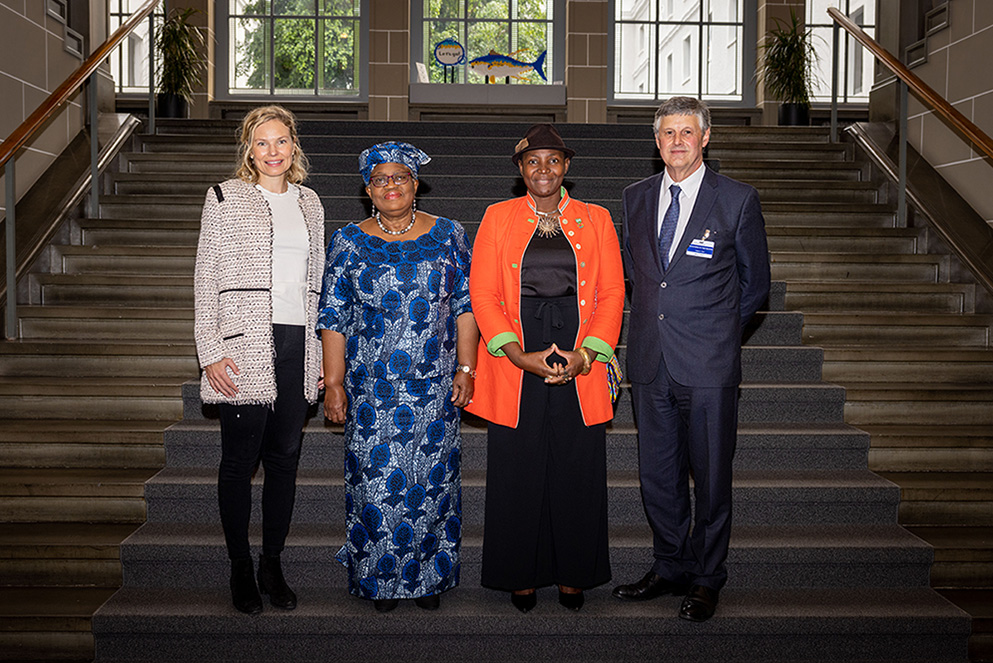CLIMATE CHANGE
More
The Trade Forum for Decarbonization Standards: Promoting transparency and coherence in the iron and steel sector brought together officials and business leaders from many of the world's largest steel-producing economies for a dialogue on coherent and transparent standards in accelerating the global scale-up of low-carbon steelmaking.
The gathering, which represents the first time that steel industry representatives have gathered at the WTO on climate issues, comes at a moment when the growing number of different decarbonization standards has sparked concern about potential incompatibility and trade fragmentation.
Speaking at the Leaders' Conversation at the start of the Forum, Director-General Ngozi Okonjo-Iweala noted that the iron and steel sector alone accounts for around 8% of global greenhouse gas emissions, with 70% of global production of primary steel relying on carbon-intensive blast oxygen furnaces.
Decarbonization standards will be key in enabling the steel sector to become carbon-neutral, yet this effort is being undermined by policy fragmentation and incompatible carbon standards — with at least 20 different standards alone, each with different underlying methodologies, the DG noted.
“The fact is that proliferation and fragmentation add costs and uncertainty, as producers struggle to make sense of a divergent array of competing policy requirements,” she said. This can be a barrier to decarbonization investment and is “the exact opposite of what we need right now, especially in a sector like steel with long-lived assets.”
The WTO “already has a track record of easing trade frictions arising from fragmented standards,” the DG said, noting the work in the WTO's Committee on Technical Barriers to Trade, which has contributed to the development of new international standards.
“I am really delighted to see so many key stakeholders here today to look at how cooperation here at the WTO can help the decarbonization journey of this vital industry,” she declared.
Princess Abze Djigma, Chair of the Princess Abze Djigma Foundation and former special envoy to Burkina Faso's President on Sustainable Development Goals and climate change, welcomed the WTO's engagement with industry on this important issue.
“I'm glad to see the WTO is highlighting that the private sector, more than ever, has a critical role to play,” she said. Because “whatever we decide, it is the private sector which is going to deliver.”
Reaching an understanding on approaches to decarbonization standards will be an essential step towards acceptance of climate-based trade measures, industry representatives said, and the WTO is the forum best placed to ensure the interests of both developed and developing countries are taken into account in discussing those approaches.
“I think the key message from the industry is there's hope because we have a path to decarbonize,” said Aditya Mittal, CEO of ArcelorMittal. “What we're looking for is equivalence so that we can continue to trade in our various markets and can continue to decarbonize, whether it's in the developed or the developing world.”
“Everyone has their own cost base to decarbonize. We need to recognize the historical context — where countries are coming from — and create a system which is fair,” he added. “And as long as we have fairness, I think everyone can put in their best effort, their best ideas, their best minds' capital behind it, to decode this.”
Noting that one out of every three tons of steel produced crosses continental borders, Dr. Edwin Basson, Director General of the World Steel Association, said the steel industry is “supremely dependent on a regulatory environment that is at least synchronous with each other or between countries … As long as these systems are well enough aligned, the industry can continue to operate successfully in an open trading environment.”
“I see no other institution that can play this role other than the World Trade Organization,” he continued. “Keeping tradable markets equitable and on a level playing field I think is key. And we are delighted that this is a discussion that comes out of the World Trade Organization.”
The Leaders Conversation was followed by two “action panels” where participants discussed current progress in setting emission thresholds for the steel industry, challenges faced by developing countries, and opportunities for driving global transparency and coherence in decarbonization standards.
The closing session looked into what role the WTO can play to address issues identified in the panel sessions.
Deputy Director-General Jean-Marie Paugam said the discussions at the Forum demonstrated the “opportunity that is now right in front of us” for business, the world trading system and WTO members in particular to come together and advance work on decarbonization and trade.
“I see a golden opportunity, a prisoner’s dilemma and milestones ahead of us,” he said. “First, we need to do a deeper dive with the private sector and standard setting organizations to understand where standards diverge and map channels for international cooperation on standards measurements and methodologies.”
“Second, we need to follow with full engagement with WTO membership,” he continued. “Third, we need to consider opportunities for additional gatherings to discuss other aspects of iron and steel value chains.”
The Forum builds on the WTO Secretariat's analytical work on carbon standards, including the most recent report focusing on the steel industry as part of the Trade and Climate Change information brief series and the 2022 World Trade Report: Climate change and international trade.
More information on the Forum is available here.
Share
Share
Problems viewing this page? If so, please contact [email protected] giving details of the operating system and web browser you are using.
